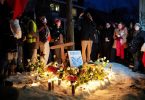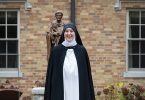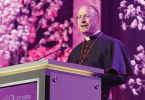
by Joe Bollig
joe.bollig@theleaven.org
KANSAS CITY, Kan. — Kate Zon had blunt words for the 24 priests who attended a COVID-19 chaplain’s training on April 17.
“This is not a time to die nobly; it’s a time to live humbly,” said Zon, with the Johnson County Pastoral Region chaplain services.
“This is now a time to be as careful as you can that you don’t infect [your household] and you don’t infect yourself,” she continued. “There’s no such thing nowadays as charging in and saying, ‘I’ll be safe.’
“No, you won’t be safe. Put on your gear. Be smart. Be careful.”
In just the last two months, priests have come to face tremendous challenges in their ministry to the sick and dying.
To prevent the spread of coronavirus, hospitals and other facilities have severely restricted access, and have instituted changes to both personal protective equipment and accepted practices.
Archbishop Joseph F. Naumann called for the training after more than 20 of the archdiocese’s younger priests volunteered to be available to administer the sacrament of the anointing of the sick specifically to those infected with COVID-19. Their willingness makes it possible to cut down on the exposure of older priests and those with underlying health conditions to the virus.

Archbishop Naumann explained his plan in a recent column in The Leaven.
“I hope to designate one priest to serve as a COVID-19 chaplain for each medical center,” he wrote in his April 24 column. “I also want to designate priests to be COVID-19 chaplains for particular regions in the archdiocese.”
The training was an important step in that process.
Zon demonstrated, among other things, how to put on and take off “personal protective equipment” — gown, gloves and mask.
Doctors Paul Camarata and Jeff Colyer gave advice on entering, leaving and working in an infectious environment.
One of the priests who participated in the online training was Father Carter Zielinski, associate pastor of Christ the King Parish and Hayden High School chaplain in Topeka.
“For me, [volunteering] was never a question,” he said. “If I’m needed for this pastoral service, it’s something I’ll do. It’s how a lot of our priests saw it, especially those of good health who are able to do so.
“We volunteer to serve, especially when dealing with those [who are] near death or are especially in need of the sacraments.”
Father Dan Weger, associate pastor of St. Michael the Archangel Parish in Leawood, recognizes the risks but is still willing to take them.
“As a younger person with a strong immune system and typically someone who gets over things pretty well, it’s something I’d be willing to take a risk for,” he said.

The training gave him confidence that if he followed correct procedures, there would be no transmission of the virus.
“The real benefit was talking to the doctors who are currently in the hospitals . . . [about what] they’re doing and what they do when they go home,” said Father Weger, “how they are making sure they are not bringing things from the hospital back home.
“It was probably my greatest concern. I said I’d be willing to live at the hospital if that was what was needed.”
Father Adam Wilczak, pastor of Divine Mercy Parish in Gardner, did not participate in the videoconference training. He and Father Andrew Strobl, pastor of St. John Paul II Parish in Olathe, underwent training at Olathe Medical Center.
“Of the priests who cover Olathe Medical Center normally, we’re the only two who live by ourselves,” he said. “So, in the event we contract the disease, we wouldn’t pass it on to any other priest.”
He found the training to be very effective.
“It went very well,” said Father Wilczak. “It was simple and to the point. We were fitted with masks. They had a test with a mister . . . to make sure we had the right mask.”
“They showed us the procedure to purify our masks with ultraviolet light so we could continue to use the mask and save our resources,” he continued. “They showed us where the PPE equipment was and how to put it on and take it off.”
Father Wilczak has a beard, so he trimmed it so the mask would fit securely.
“They mentioned [my beard] as a possible concern, but when I went through the test . . . [and] I couldn’t taste or smell what they were spraying . . . they said that I was fine,” he said.
Father Anthony Ouellette, pastor of Holy Name of Jesus Parish in Kansas City, Kansas, also wears a beard. He’d prefer to keep it, but will shave if he has to.
He understands, he said, how Catholics might have concerns about access to the sacraments during a health crisis.
What are sometimes referred to as “the last rites” are the sacraments of confession, the anointing of the sick and holy Communion.
“If you’re living your faith and you’re doing that well, you should regularly receive the sacrament of confession,” said Father Ouellette. “You can speak to your priest about . . . receiving the sacrament of the anointing of the sick [due to age or illness], and you should be receiving Communion.”
If one is sick, his advice is that the parishioner or a family member call the priest to come to the home to administer the sacraments before the parishioner goes to the hospital.
This is much easier for both the priest and the parishioner, he said.
Many people believe, incorrectly, that they are not meant to call for an anointing until the patient is near death.
“People push it off,” said Father Ouellette, “believing if they allow the priest to do these rites, then they’ve given up on the person they love.
“Because of that, they wait until the last moment to invite the priest to administer these sacraments, which hinders the person’s ability to make a confession or receive Communion.”
“We need to change that mentality,” he concluded. “It’s very important that we don’t wait until the last moment.”






